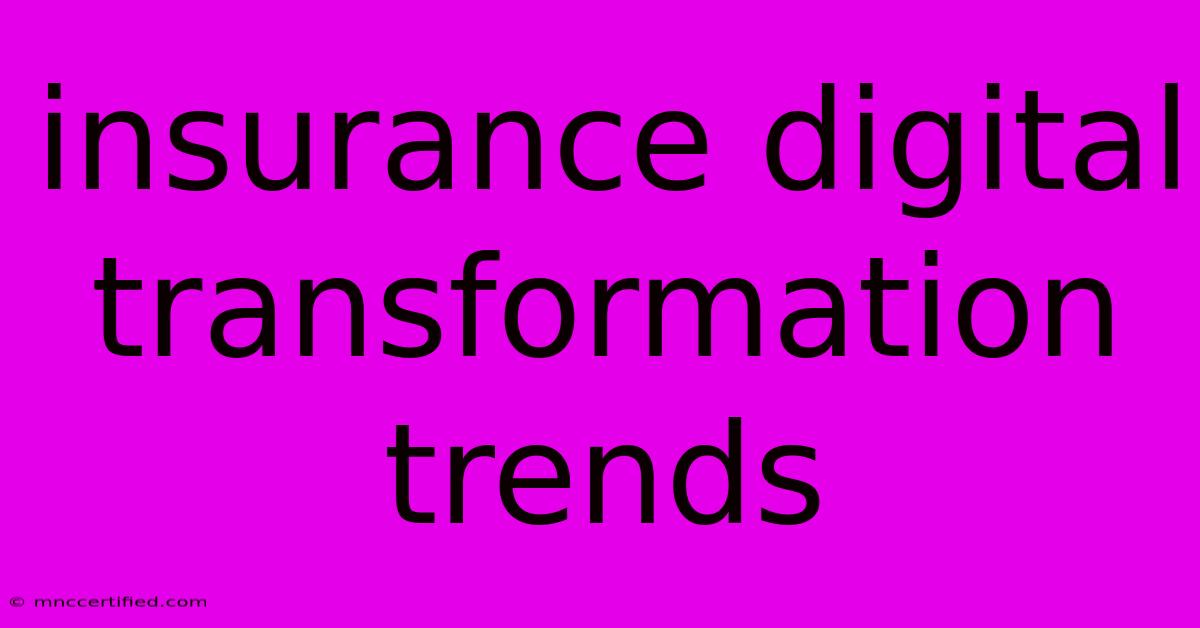Insurance Digital Transformation Trends

Table of Contents
Insurance Digital Transformation Trends: Shaping the Future of the Industry
The insurance industry is undergoing a dramatic transformation, driven by the relentless march of technology. Digital transformation is no longer a buzzword; it's a necessity for insurers to stay competitive and meet the evolving needs of their customers. This article delves into key trends shaping this digital revolution and how insurers can navigate them for success.
1. Personalized Customer Experiences
Gone are the days of one-size-fits-all insurance solutions. Today's customers demand personalized experiences, tailored to their unique needs and preferences. Insurers are embracing this shift by leveraging data and AI to:
- Offer tailored product recommendations: Analyze customer data like age, location, lifestyle, and driving history to offer relevant and competitive insurance packages.
- Provide seamless omnichannel experiences: Offer consistent interactions across multiple channels, including mobile apps, websites, chatbots, and social media.
- Offer proactive customer service: Utilize AI-powered chatbots and virtual assistants to provide instant answers to frequently asked questions and resolve issues efficiently.
2. The Rise of Insurtech
Insurtech startups are disrupting the insurance landscape with innovative solutions that leverage technology to offer faster, more efficient, and user-friendly insurance experiences. These innovations are driving trends like:
- Micro-insurance: Offering affordable, bite-sized insurance policies for specific needs, like travel or gadget protection.
- On-demand insurance: Providing insurance coverage only when needed, like for short-term rentals or specific activities.
- Usage-based insurance: Charging premiums based on actual usage, offering lower rates for safe drivers or infrequent travelers.
3. Embracing the Power of Data and AI
Data is the lifeblood of digital transformation. Insurers are increasingly leveraging data analytics and AI to:
- Improve risk assessment: Utilize sophisticated algorithms to analyze vast amounts of data and predict risk factors, leading to more accurate pricing and underwriting.
- Detect and prevent fraud: Implement AI-powered fraud detection systems to identify suspicious claims and minimize losses.
- Personalize pricing: Offer dynamic pricing based on individual risk profiles, creating a more equitable and transparent pricing model.
4. Building a Secure and Scalable Ecosystem
Cybersecurity is paramount in the digital age. Insurers need to invest in robust security measures to protect sensitive customer data and prevent cyberattacks. Additionally, cloud computing offers scalability, cost-efficiency, and agility, allowing insurers to adapt to rapidly changing market demands.
5. The Future of Insurance: Seamless Integration and Automation
The future of insurance lies in seamless integration and automation. Insurers are exploring technologies like:
- Blockchain: To create transparent and secure record-keeping for claims processing and policy management.
- Internet of Things (IoT): To monitor insured assets and provide real-time data for risk assessment and personalized pricing.
- Robotic Process Automation (RPA): To automate repetitive tasks, freeing up employees to focus on high-value activities.
Conclusion: Embracing the Digital Future
Digital transformation is a journey, not a destination. Insurers need to remain agile and embrace emerging technologies to stay ahead of the curve. By adopting the trends discussed above, insurance companies can deliver superior customer experiences, improve operational efficiency, and position themselves for success in the digital era.

Thank you for visiting our website wich cover about Insurance Digital Transformation Trends. We hope the information provided has been useful to you. Feel free to contact us if you have any questions or need further assistance. See you next time and dont miss to bookmark.
Featured Posts
-
Uf Coach Accused Sexual Harassment Stalking
Nov 09, 2024
-
Nepal Opens Asia Qualifier With Victory
Nov 09, 2024
-
Spains Girona Region Suffers Major Flooding
Nov 09, 2024
-
Judge Strikes Down Illinois Assault Weapons Ban
Nov 09, 2024
-
Heavy Snow Forecast Colorado Storm Update
Nov 09, 2024